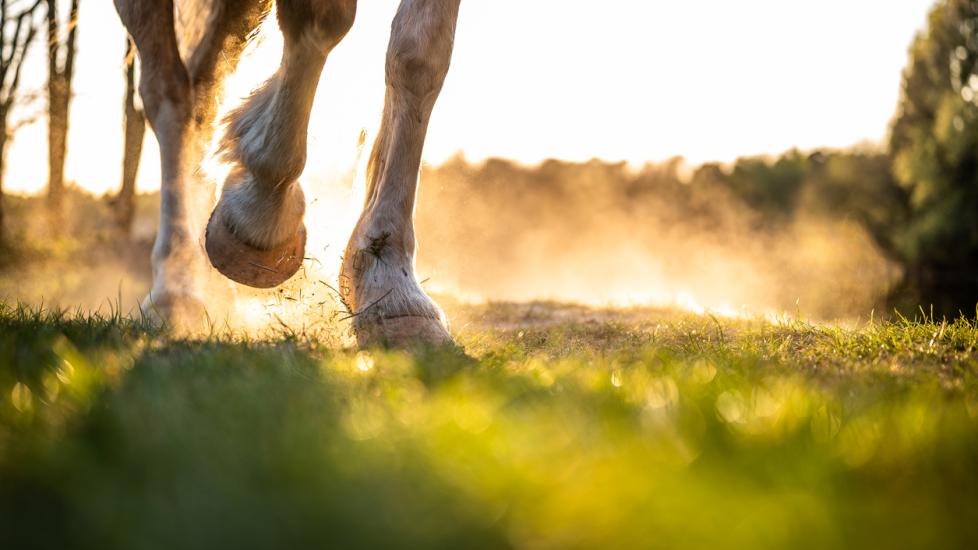Thrush in Horses
What is Thrush in Horses?
Thrush is a common condition in horse hooves, caused by anaerobic (doesn’t require oxygen to grow) bacteria that when left untreated, may invade sensitive tissue within the foot. This can cause prolonged infection and lead to lameness. Thrush in horses is often found in and around the frog, specifically the collateral sulci (grooves adjacent to and in the middle of the triangle-shaped frog) and/or the central sulcus (cleft between the heels).
Symptoms of Thrush in Horses
The typical signs of thrush include:
-
Foul smelling discharge
-
Watery or oily discharge (often black in color)
-
Tenderness in the frog region
-
Fissure or deep pockets extending to the heel bulbs
-
Loss of frog shape and integrity
-
Soft/crumbly soles
-
Lameness
Causes of Thrush in Horses
Thrush in horses is most often seen during wet conditions or geographic regions where horses are often in snow or mud. Thrush thrives in moist, dark, poorly oxygenated environments. While wet conditions promote the environment for thrush, it is not the only cause.
An unhealthy hoof can also cause thrush formation. Horses that are standing (such as in a stall) all day and not moving as they naturally would, do not promote good blood flow to their hoof.
Poor hoof care and maintenance can also be attributed to causing thrush. Maintaining good hoof care by having regular maintenance from a farrier can help promote a balanced and supportive hoof. A balanced hoof allows for better movement/activity which leads to good blood flow and overall health of the hoof.
How Veterinarians Diagnose Thrush in Horses
A veterinarian will be able to diagnose thrush in horses based on history and physical exam of the horse's foot. The veterinarian may use a tool called a hoof tester to test for pain along different areas of the hoof. Thrush can be recognized mostly by its black discharge and foul smell. Your veterinarian may ask you the following:
-
How often do you clean out your horse’s hooves?
-
What does your horse’s daily activity look like?
-
Does he stand in a stall or is turned out in pasture or paddock for exercise?
-
How often does your horses see the farrier?
Treatment of Thrush in Horses
Treatment for thrush in horses depends upon the severity of the case. A veterinarian or farrier will cut away any frog or hoof that is unhealthy or areas that allow trapping of bacteria. If the thrush is mild, then treatment may consist of daily cleaning of the hoof and applying commercial/over the counter (OTC) topical treatment for thrush to the affected area.
A moderate to severe case of thrush or a case that is not responding to OTC products may require more advanced treatment by your veterinarian. This may include more severe debridement (cutting away) of the infected area, prescription medications, antibiotics, a hospital plate applied to the hoof and a tetanus shot.
With all cases of thrush, new care management practices may need to be implemented to keep the horse out of any wet or muddy ground. Keeping the hoof clean and dry is extremely important for the treatment of thrush in horses.
Over-the-counter treatment for thrush in horses includes:
Recovery and Management of Thrush in Horses
Recovery of thrush will be dependent on the severity of the case. Mild cases may show improvement within a week of daily cleaning and treatment. More severe cases could take several months for the frog and hoof to grow out healthy tissue. If left untreated, thrush in horses may lead to:
-
Poor hoof growth
-
Conformation defects
-
Systemic infection
-
Cellulitis
Prevention of Thrush in Horses
Thrush in horses can be prevented by the following:
-
Daily cleaning of horse’s hooves
-
Keep horse in a clean environment free of any moisture, mud, manure, etc.
-
Keep your horse on a regular hoof trimming/farrier schedule
-
Keep your horse active with daily exercise to help promote a healthy hoof
Thrush in Horses FAQs
How serious is thrush in horses?
Thrush is generally mild and can be resolved with over the counter thrush products and good hoof management. If left untreated, thrush can become a serious issue and lead to lameness.
Is thrush painful for horses?
Thrush in horses can become painful if left untreated and causes damage to the frog, hoof, and heel leading to lameness issues.
References
-
Judd B. US Equestrian. Hoof Help: Thrush. June 2020.
-
Paul Pion DVM, Spadafori G. Veterinary Partner. Thrush in Horse’s Hooves. August 2017.
-
Fabus, Taylor. Michigan State University Extension. Preventing and treating thrush in horses. 2019.
Featured Image: iStock.com/photography-wildlife-de
